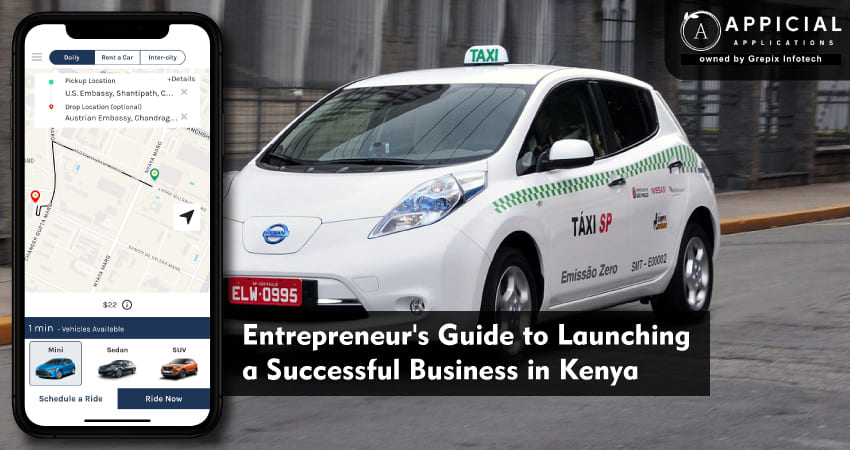
Entrepreneur's Guide To Launching A Successful Business In Kenya
Starting a new business in Kenya is an exciting yet challenging journey that requires thorough planning, understanding of the local market, and adherence to legal procedures. This guide aims to navigate aspiring entrepreneurs through the process of setting up a business in Kenya, covering essential aspects from the initial planning stage to the launch and beyond.
Starting a new business in Kenya can be a thrilling and rewarding endeavor, offering opportunities for growth, innovation, and financial success. However, the journey from concept to launch involves navigating a series of steps and understanding the local business environment. This guide aims to provide a comprehensive overview of how to start a new business in Kenya, covering essential aspects such as legal requirements, market research, financing, and more.
This comprehensive guide explores the journey of creating a taxi app in 2024, highlighting the immense potential for companies in the on-demand transportation sector. It covers essential steps from conducting detailed market research, defining target audiences, to integrating advanced features and payment systems. Emphasizing the importance of user-friendly design and robust back-end infrastructure, the guide also discusses the significance of safety features and competitive pricing strategies. By following this roadmap and leveraging modern technologies and resources, businesses can successfully launch a taxi app that meets evolving consumer demands and captures a significant share of the growing market.
Understanding the Kenyan Market
Kenya is East Africa's hub for financial, communication, and transportation services. Its strategic location, along with a well-developed business infrastructure, makes it an attractive destination for entrepreneurs. However, understanding the local business environment is crucial. This includes being aware of the economic trends, consumer behavior, and regulatory landscape that could impact your business.
Before diving into the business setup process, it's crucial to conduct market research to understand the Kenyan business landscape. Kenya's economy is diverse, with significant contributions from agriculture, manufacturing, services, and technology sectors. Nairobi, the capital, is a hub for tech startups and innovation, often referred to as "Silicon Savannah." Understanding market trends, customer needs, and competition will help you tailor your business idea to ensure it meets market demands and has a competitive edge.
Step 1: Market Research and Business Idea Validation
The first step in starting a new business is to identify a viable business idea. Conduct thorough market research to understand the needs of your target market, identify gaps in the market, and analyze your competition. Tools and methods such as surveys, interviews, and SWOT analysis (Strengths, Weaknesses, Opportunities, Threats) can be invaluable in validating your business idea and formulating a unique value proposition.
Step 2: Creating a Business Plan
A well-crafted business plan is essential for the success of any new venture. It should outline your business idea, market research findings, marketing and sales strategies, management structure, operational plan, and financial projections. A comprehensive business plan not only guides your business's growth but also is crucial for securing financing.
Step 3: Choosing a Business Structure
In Kenya, you can register your business as a sole proprietorship, partnership, limited company, or cooperative. Each structure has its legal implications, tax obligations, and registration processes. Consider factors such as the nature of your business, the level of risk you're willing to take, and your growth plans when choosing a business structure.
Step 4: Registering Your Business
Registration can be done through the eCitizen portal, Kenya's online government services platform. The process includes searching and reserving a business name, filling out the necessary registration forms, and paying the registration fees. Once registered, you will receive your business registration certificate, which is essential for all business operations in Kenya.
Step 5: Licensing and Permits
Depending on the nature of your business, you may need various licenses and permits to operate legally in Kenya. This can range from a single business permit from the county government to specific licenses for activities such as importation, manufacturing, or providing certain services. Ensure you understand and comply with all regulatory requirements to avoid penalties.
Also Read: Top Taxi Apps in Zambia: Revolutionizing Urban Mobility
Step 6: Setting Up Your Business Location
Choosing the right location is crucial for the success of your business. Consider factors such as target market proximity, accessibility, competition, and cost. Whether you're leasing a commercial space or setting up an office, ensure the location aligns with your business objectives.
Step 7: Financing Your Business
Securing adequate financing is one of the most challenging aspects of starting a new business. Options in Kenya include personal savings, loans from financial institutions, venture capital, angel investors, and government grants. Evaluate each option's pros and cons, and choose the one that best suits your business needs.
Step 8: Hiring Employees
As your business grows, you may need to hire employees. In Kenya, this involves understanding labor laws, drafting employment contracts, and registering with the National Social Security Fund (NSSF) and the National Hospital Insurance Fund (NHIF). Hiring the right team is crucial for your business's success, so take the time to conduct thorough interviews and background checks.
Step 9: Marketing and Sales Strategy
Developing a solid marketing and sales strategy is essential for attracting and retaining customers. This can include online marketing, social media engagement, traditional advertising, and networking. Understand your target market's preferences and behaviors to tailor your marketing efforts effectively.
Step 10: Launching Your Business
With all the groundwork done, it's time to launch your business. This can involve a soft launch to test your products or services in a controlled environment or a grand opening event to generate publicity. Ensure you have a plan for collecting feedback and making necessary adjustments to your offerings.
Conclusion
SStarting a new business in Kenya involves careful planning, understanding of the local business environment, and compliance with legal requirements. By following the steps outlined in this blog, aspiring entrepreneurs can increase their chances of success. Remember, patience, resilience, and flexibility are key attributes that will serve you well on this journey. Whether you're aiming to tap into local markets or expand globally, Kenya offers a wealth of opportunities for determined and innovative entrepreneurs.





